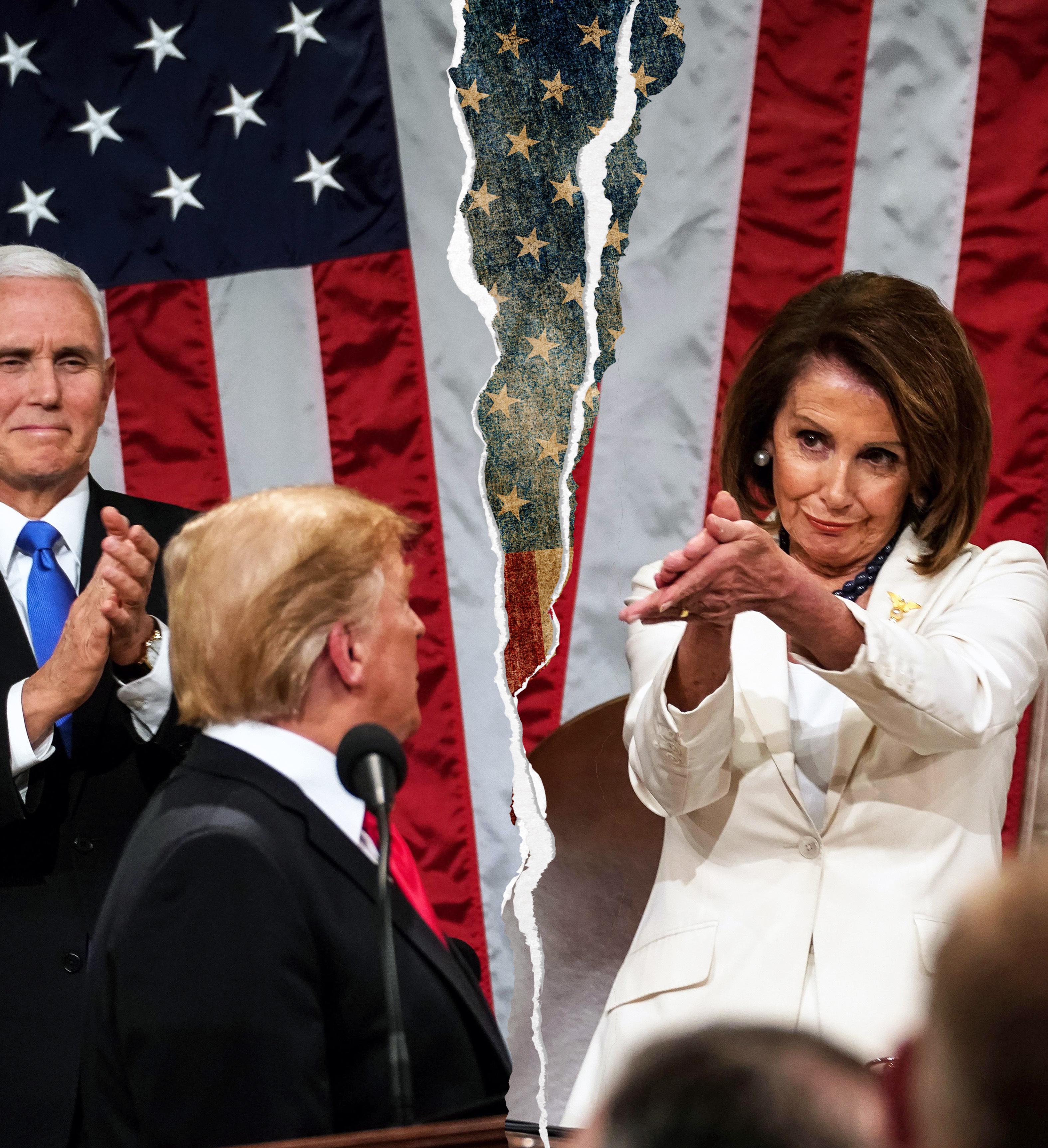
Trump’s longest tweet yet: State of the Disunion
Finding differences between President Trump’s State of the Union address last Tuesday and the daily content he posts on Twitter would likely prove to be a…
With the help of a teleprompter and his band of loyal Republican Congressmen rising over and over again throughout the night in praise of his assertions, Trump did his best to depict an America thriving like never before - but one still threatened enough to be in desperate need of a wall along its southern border, too.
In the wake of an unpopular 35-day government shutdown, for which Trump assumed full responsibility on national television, Tuesday’s speech presented an opportunity - and a challenge - for the president to strike a more bipartisan tone, and regain some of the support he lost over the past month and a half.
Democrats’ official responses, as well as reactions from other top party leaders, suggest he fell short of this mark, however, painting vividly the division that dominates Washington, D.C., these days.
Not surprisingly, President Trump dedicated a bulk of his national address to yet another attempt to rally support for his long-promised border wall along the country’s southern border with Mexico. On the heels of a 35-day government shutdown - the longest in U.S. history - and with another looming should no agreement be reached later this month, Trump fear-mongered his argument into existence once again.
He cited “large-scale caravans on the march” heading for the U.S., again. He argued that “illegal immigration isn’t compassionate, it’s really cruel,” and that “countless Americans have been murdered by illegal immigrants.” He inflated data on the number of arrests and crimes committed by illegal immigrants, and he touted his “common-sense” border security proposal, which includes plans for a “new physical barrier, or wall.”
None of this is new coming from the president, and it’s no surprise that Democratic responses to his expected argument were at the ready, highlighting the human consequences of the hardline immigration approach.
Stacey Abrams, the former Democratic candidate for Governor of Georgia, countered with her own view of the role compassion should play when it comes to our immigration policy, in the party’s official response to Trump.
“Compassionate treatment at the border is not the same as open borders,” she said, adding that the nation is stronger with immigrants, not walls.
California Attorney General Xavier Becerra, meanwhile, dedicated a majority of his Spanish-language response to railing against the Trump administration’s immigration agenda. The California Attorney General drew on his own family’s experience as immigrants from Mexico, asserting that “the nation is strong because families like mine and yours built it.”
He countered Trump’s fear-mongering by using walls as a theme throughout his own speech - describing how the president’s policies are building symbolic walls between Americans and their healthcare, Americans and the voting booths, and between immigrant parents and their children being placed in cages along the border.
Becerra pointed to the 2018 midterm results, and how they effectively prevented Trump from following through on his wall, pleading that that same voter energy must carry over into 2020.
The economy is President Trump’s strongest talking point. Critics can debate how much of this is carryover from the Obama administration, and how much credit Trump truly deserves, but this might not matter to the American people so much. The reality is, the economy is strong today, and Americans like that.
Knowing this, Trump cited the country’s economic performance as his administration’s “greatest accomplishment.” He referenced the more than 5 million new jobs created since he took office two years ago, and he highlighted the “massive tax cut” Republicans passed in 2017, as well as his administration’s increase of the child tax credit.
Democrats’ responses, meanwhile, tended to keep their distance from the economy. The closest Abrams and Becerra got to touching on the subject was highlighting the decidedly bad-for-the-economy longest shutdown in U.S. history, which Trump orchestrated in an attempt to nudge Democrats into supporting funding for his much longed-for border wall.
Abrams also criticized the Republican tax bill for inflaming the wealth gap, which has been Democrats’ go-to argument in opposition to the legislation, since it was first introduced.
Healthcare was one of the more difficult-to-follow themes of Trump’s address.
The speech’s most glaring contradiction was Trump stating his “will” to support medical coverage for those with pre-existing conditions, while simultaneously flaunting his intentions to dismantle the Affordable Care Act, which guarantees such protections.
He also advocated for the reduction of prescription drug prices, the fight against childhood cancer and the eradication of HIV by 2030, ignoring the fact that his administration’s previous budgets contemplated important cuts in those very efforts.
The Trump Administration has shown an aggressive willingness to improve access to generic drugs, including proposals that require drug makers to show prices on television ads in an attempt to "avoid secret refunds" between pharmaceutical companies and intermediaries.
And, though the president touched on the issue by stating that it is "unacceptable that Americans pay vastly more than people in other countries for the exact same drugs, often made in the same place," he did not propose a specific strategy to address this problem.
For the Democrats who plan to challenge Trump in 2020, this is a fundamental combat weapon.
"The problem with this president," said Democratic presidential candidate Julian Castro, "is that we can no longer trust his words."
Castro’s statements on Jimmy Kimmel's late night show also further confirmed the importance of healthcare in the national political discourse, especially after polls determined the issue was a critical factor for voters in the midterm elections which saw Democrats regain the House of Representatives.
"There are seven million people, for instance, that have lost healthcare coverage during this administration,” Castro said. "If (Trump) wants to make an investment, instead of putting billions of dollars in a wall, he should put billions of dollars towards Medicare-for-all so that everyone can have healthcare in this country."
Castro is not alone here - Democrats have increasingly embraced Medicare-for-all as part of their party platform heading into 2020.
Finally, what remained clear as day is that Trump and his advisors will do everything possible to continue their opposition to abortion rights.
The president strongly denounced legislation passed recently by states such as New York and Virginia, which would allow access to abortion procedures up to 24 weeks; what he failed to mention, however, is that the laws stipulate that "the life of the mother or the fetus be seriously threatened."
One major consequence of Donald Trump’s ascendance to the presidency has been the life it has breathed into an energized women's rights movement.
Democrats, responsible for 106 of the 121 women now serving in the House of Representatives, made sure to symbolize the fight for equality front and center, at the president’s biggest annual speech to the American people.
Many of these Congresswomen dressed in white to honor all those who dedicated their lives to the struggle for the right to vote.
The country’s focus was on two women, in particular: New York Congresswoman Alexandria Ocasio-Cortez, and House Speaker Nancy Pelosi.
The president's first meeting with Pelosi after the government shutdown - and especially after the Speaker had denied him the first date for his speech - was nothing short of memorable.
Aware of where she was sitting, in full view of the cameras for the duration of Trump’s 82-minute speech, Pelosi communicated her thoughts through her body language, making her positions clear with each claim made by the president, only sometimes rising, reluctantly, in approval of his words.
But, it was Pelosi's condescending applause directed at Trump that won her perhaps the night’s most memorable moment.
"We must reject the politics of revenge, resistance, and retribution, and embrace the boundless potential of cooperation, compromise, and the common good," Trump declared.
RELATED CONTENT
In response, Pelosi rose and clapped - seemingly at - the president, a gesture that was dripping in sarcasm, and about which her daughter helped provide some more context.
“She knows. And she knows that you know. And, frankly, she's disappointed that you thought this would work. But here’s a clap," Christine Pelosi tweeted.
For her part, Ocasio-Cortez was not so kind to the president. She used her body language to signal disapproval throughout the night, remaining seated while others stood in applause, and she had with her a pin to honor Jakelin Caal Maquin, one of the immigrant children who died in the custody of Immigration and Customs Enforcement (ICE).
"Why should I be ‘spirited and warm’ for this embarrassment of a SOTU?" Ocasio-Cortez tweeted after the speech, in response to online criticism of her demeanor.
"Tonight was an unsettling night for our country. The president failed to offer any plan, any vision at all, for our future. We are flying without a pilot. And I'm not here to comfort anyone about that fact," she explained.
With the strength of the record number of women in Congress in full display, Trump also attempted to bask in that success.
"No one," he said, "has benefited more from our thriving economy than women, who have filled 58 percent of the newly created jobs in the last year."
The sea of Democratic women clad in white applauded the president, sincerely, for the first time.
But the illusion was short lived. Between smiles, Trump attempted once again to tell women what they could, and could not, do.
"You were not supposed to do that," he said.
And, as they sat back down, he instructed them again to "don’t sit yet, you’re going to like this," as he added that, for the first time, "we have more women serving in Congress than ever before" - as if that achievement were thanks to him, rather than in opposition to him.
Meanwhile, Pennsylvania’s senators, Democrat Bob Casey and Republican Pat Toomey, responded predictably to Trump’s address.
Casey, like the official Democratic responders, released a statement condemning the recent government shutdown, and he decried Trump for not taking the opportunity to lay out an agenda to address healthcare, education, and violence.
“Unfortunately, he used his platform tonight to reinforce the same talking points and to double down on his corporate agenda,” Casey said.
Toomey expressed his satisfaction with Trump’s address, with the exception of the president’s policies on trade and tariffs.
"On trade, I continue to believe that the administration is taking us down the wrong path. Tariffs on products imported into the United States are taxes, paid by American consumers, that harm American families, and workers,” he said.
Toomey, however, heaped praise on Trump’s comments about healthcare, the state of the economy, and for the “reasonable case” he believes the president made for his border wall.
At the local level, Philadelphia Councilwoman Maria Quiñones-Sanchez tweeted her admiration for the women — and especially the Puerto Rican women — attending the State of the Union as Congresswomen.
“Yes, these women are united and inspiring,” she tweeted about the white-clad Congresswomen.
And later, in response to a photo posted by New York Congresswoman Nydia Velasquez, of herself with Alexandria Ocasio-Cortez, Quiñones-Sanchez tweeted: “Yes. Boricua Proud! We have great fighters and our future is promising!”
On an evening in which the country’s lack of unity was on full display, moments of inspiration and optimism were few and far between - but they were also impossible to ignore.










LEAVE A COMMENT:
Join the discussion! Leave a comment.